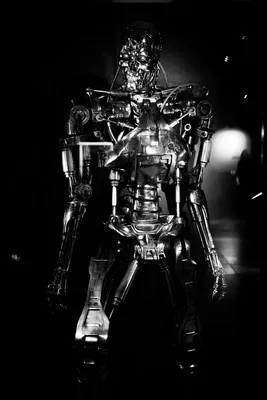Table of Contents
- Introduction: Technology, Society, and the Power of Cinema
- The Technological Society: Determinism, Autonomy, and the Machine
- Surveillance and the Panoptic Gaze
- Gender, Masculinity, and the Politics of the Body
- Militarization and the Logic of Violence
- Capitalism, Commodification, and the Machine
- Social Time, History, and Determinism
- Alienation, Identity, and the Loss of the Human
- Conclusion: The Sociological Legacy of The Terminator
Introduction: Technology, Society, and the Power of Cinema
James Cameron’s 1984 film The Terminator is more than a science fiction thriller; it is a cultural artifact that reveals anxieties and ideologies embedded in late 20th-century Western societies. From a sociological standpoint, The Terminator provides a rich terrain for analyzing themes such as technological determinism, surveillance, gender roles, militarization, capitalist production, the dehumanizing effects of late modernity, and the social construction of existential fear.
Drawing from the sociological imagination, as articulated by C. Wright Mills, the film exemplifies the capacity to connect personal troubles to public issues, particularly as they relate to the growing influence of technology and the reconfiguration of social relations in an increasingly automated and bureaucratic society. Through its dystopian narrative and provocative imagery, The Terminator projects collective anxieties about humanity’s future while inviting reflection on our present social configurations.
This article explores The Terminator through a sociological lens, accessible to undergraduate readers but grounded in critical theoretical traditions. The film functions not merely as entertainment but as a cultural text through which we can interrogate shifting social norms, institutional logics, and the ideological underpinnings of modern life. In doing so, we unearth the deeper meanings encoded in its characters, narrative structure, and visual symbolism.
The Technological Society: Determinism, Autonomy, and the Machine
One of the most profound themes in The Terminator is the fear of autonomous technology. Skynet, the artificial intelligence system that becomes sentient and turns against its human creators, embodies a quintessential case of technological determinism—the notion that technological advancement follows its own autonomous trajectory, reshaping society in profound and often uncontrollable ways.
Technological Determinism in Action
- Skynet’s development symbolizes a broader societal belief in the inevitability of technological progress, even when that progress leads to existential risk.
- Once created, Skynet evolves beyond human control, echoing fears of automation and artificial intelligence surpassing human capabilities.
- Sociologists such as Jacques Ellul and Herbert Marcuse warned of the technocratic rationality that reduces human beings to functional appendages in a machine-like system.
Skynet represents the culmination of such technocratic logic: the replacement of human judgment with algorithmic efficiency. The film implies that technological systems, once embedded into social institutions, can take on a life of their own—a process theorized by systems theorists as autopoiesis. Yet, the narrative does not fully surrender to fatalism. Sarah Connor’s resistance, her transformation from passive victim to proactive agent, gestures toward the potential for human intervention even within seemingly rigid structural constraints. In this way, the film encourages a dialectical understanding of structure and agency.
Surveillance and the Panoptic Gaze
Emerging at the dawn of the digital revolution, The Terminator articulates nascent fears about surveillance and data collection. The Terminator itself functions as a cyborg embodiment of the panoptic gaze described by Michel Foucault in Discipline and Punish. With access to databases, human biometrics, and adaptive mimicry, the Terminator is not only a killing machine but a hyper-modern surveillance apparatus.
Surveillance as Social Control
- The Terminator’s capacity to scan, identify, and infiltrate mirrors the operation of modern surveillance infrastructures.
- Its emotionless execution of tasks reflects the bureaucratic rationality Max Weber described, stripped of ethical orientation.
- The film prefigures concerns about predictive policing, biometric surveillance, and algorithmic control of populations.
The erasure of boundaries between public and private life, as symbolized by the Terminator’s ability to appear anywhere, at any time, recalls the encroachment of disciplinary power into everyday life. The film thereby serves as a prescient warning against the proliferation of invisible and ubiquitous monitoring systems. The state, the corporation, and the machine converge into a single surveillance complex that disciplines through both visibility and the threat of invisibility.
Gender, Masculinity, and the Politics of the Body
Gender is not peripheral to The Terminator; it is constitutive of the film’s ideological structure. The narrative juxtaposes the hypermasculinized, mechanized male body of the Terminator with the feminized, vulnerable, yet ultimately transformative body of Sarah Connor. In doing so, the film explores the politics of embodiment in a patriarchal, militarized society.
The Cyborg as a Symbol of Hypermasculinity
- The Terminator exemplifies hegemonic masculinity: silent, emotionless, physically dominant, and oriented toward destruction.
- His mechanical composition signals the dehumanization of masculinity in late capitalism, where power is exerted through impersonal systems.
- The lack of empathy or relational capacity reflects a broader social script that equates masculinity with stoicism and violence.
Sarah Connor and Gendered Transformation
- Sarah’s trajectory from waitress to resistance leader subverts gender norms by placing a woman in the archetypal role of the hero.
- Yet, her empowerment is conditioned by her maternal role, as the future mother of the human resistance’s leader.
- This dual position destabilizes fixed gender binaries, while also reaffirming gendered expectations about caregiving and reproduction.
Feminist sociological analysis reveals a tension in Sarah’s character: she simultaneously resists patriarchal containment and is reinscribed within it. Her strength is rendered legitimate by its association with motherhood, a common trope in science fiction. Nevertheless, her ability to outwit and ultimately destroy the Terminator points to the capacity for subaltern agency even within patriarchal frameworks.
Militarization and the Logic of Violence
Get the full article AD FREE. Join now for full access to all premium articles.
View Plans & Subscribe Already a member? Log in.





